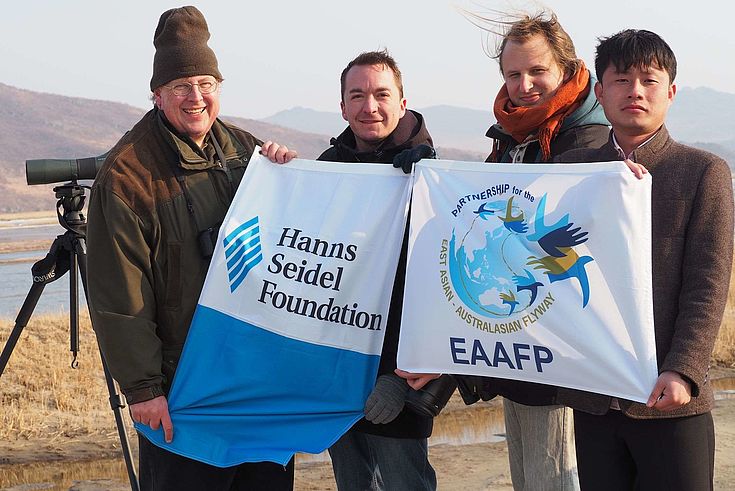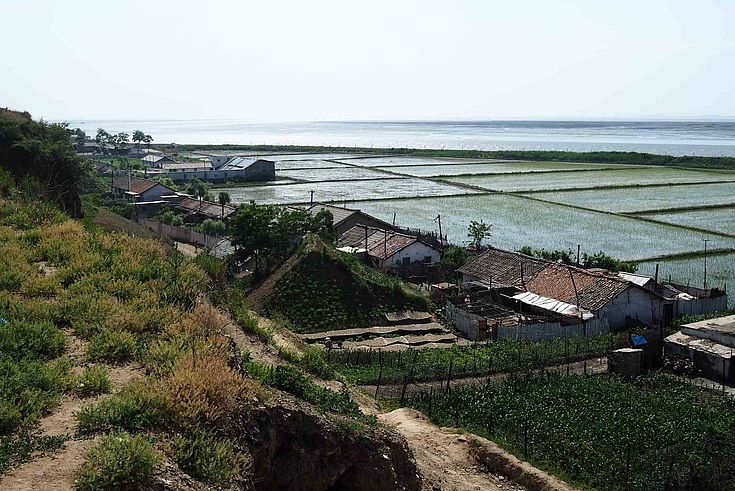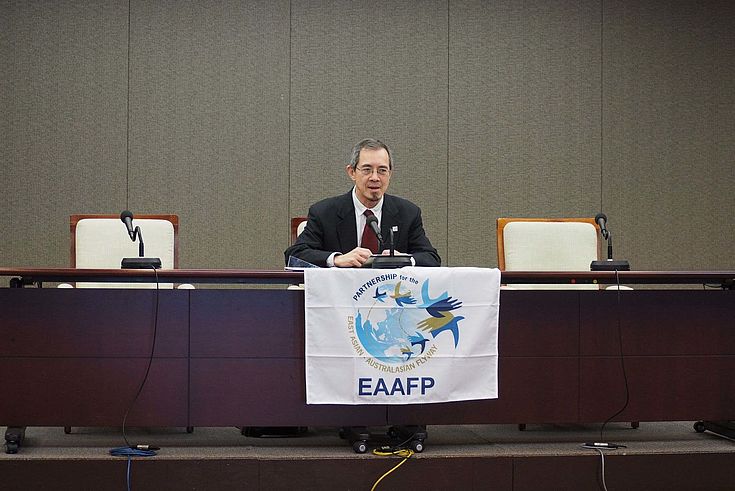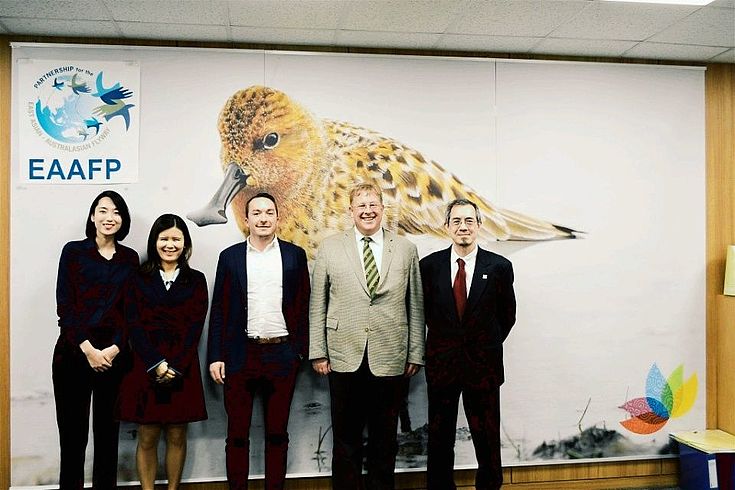DPRK becomes 36th Partner to the EAAFP
Environmental Cooperation on the East Asian - Australasian Flyway
Launched in 2006, the East Asian - Australasian Flyway Partnership (EAAFP) is a network of partners - including governments (South Korea, China et al.), inter-governmental agencies (Ramsar convention on wetlands et al.), NGOs (Hanns Seidel Foundation, WWF et al.) and partners from the international business sector. The flyway stretches from the Russian Far East and Alaska, southwards through East Asia and Southeast Asia, to Australia and New Zealand and encompasses 22 countries of which by now 18 countries (Laos, Brunei, Papua New Guinea, and East Timor have not joined yet) are official partners of the EAAFP. Over 50 million migratory waterbirds are using the East Asian - Australasian Flyway from over 250 different populations to go from the Northern breeding grounds to the South for wintering before flying back again. During migration, the waterbirds use the wetlands to rest, feed and to build up sufficient energy to fuel the next phase of their journey. However, many of the species on the flyway are endangered today. In the last decades, due to the fast proceeding economic development in the whole Asian region, many places for the birds fell victim to this development. During the previous 50 years, around 70% of their habitats have been reclaimed for coastal development, ports, and urban industries.
North Korea an important partner on the flyway
Another important environment, not only for the animals but also for people are tidal flats because they absorb and store carbon from the atmosphere. Many of these tidal flats are located in the Yellow Sea region on the coasts of China, South Korea, and North Korea. A combination of the shallow sloping sea bottom and large tidal-range in the Yellow Sea stipulated the development of some of the world's most extensive tidal-flats, covering an area of approximately 20,000 km2. Nevertheless, the Yellow Sea is also one of the most heavily-exploited and disturbed marine regions in the world (Yellow Sea Ecoregion Planning Programme 2008). Further, it is located in one of the world's most densely populated regions and the catchments of its major rivers, including the Yellow and Yangtze Rivers in China and the Han River in the ROK, support more than 10% of the global human population. Especially these intertidal wetlands around the coastline on the west coast of the DPRK are crucial for birds. Thus, the Korean peninsula is of great importance due to its central location on the East-Asian Australasian Flyway, the most important flight route of migratory birds in East Asia.
In 2018, the DPR Korea has acceded to the Ramsar Convention on Wetlands and have designated the Mundok Migratory Bird Reserve and Rason Migratory Bird Reserve as their first two Ramsar Sites. After joining the Ramsar Convention on Wetlands, the DPRK was now accepted as a member country of the EAAFP, making the DPRK the 18th governmental partner in the partnership, which is supporting the protection of birds and their habitats on the flyway between Alaska and New Zealand.
As part of the process to join the EAAFP, the DPR Korea has nominated the Mundok Migratory Bird Reserve and Kumya Wetland Migratory Bird Reserve as their first two Flyway Network Sites in the EAAF. Through joining the EAAFP, the DPR Korea will be able to work closely with EAAFP Partners on a variety of programmes to support the conservation of migratory waterbirds with the result that a sustainable management of the habitats benefits both people and the environment. This will include efforts along the coast of the Yellow Sea region where large areas of important tidal-flat habitat remain. Aside from this, also South Korea has currently eleven flyway network sites et al. Upo Wetland, Junam Reservoir, Yubu-do Tidal Flat or the Han River Estuary.
North Korea joins the EAAFP
EAAFP officially announced DPRK is joining as the 18th member country and the 36th partner to the EAAFP to the partnership with a press conference on April, the 16th. Dr. Lew Young - who is well known to HSF Korea through his former capacity as the Regional Advisor for Asia at the Ramsar Secretariat - elaborated that all countries need to be engaged in the protection of wetlands because the survival of birds depends on the various states they pass through on their route. It is not enough if only one country puts a lot of effort in habitat protection and others do not as it will not help the birds on the flyway and the environment cannot be conserved sustainably. Engagement with all countries on the route is essential and necessary. Therefore, the admission of the DPRK to the EAAFP can be seen as another success on the way to protect birds and their habitats sustainably. Dr. Lew Young further stated: "Environment protection is linked to the stage of development a country is and thus, the DPRK, unlike South Korea, has a smaller amount of resources available to put into environmental protection". Nevertheless, he strengthened that the DPRK is very interested in improving its environment, which in return led to a lot of different countries and organizations ushering that they are willing to give technical and monetary assistance to the DPRK.
After the DPRK has designated two key sites, site evaluation for further protection can be started. For this the EAAFP plans to go on a two-day visit together with several partner organizations to Mundok Migratory Bird Reserve, after celebrating DPRK's accession to the Ramsar Convention and the EAAFP on the 16th of May in Pyongyang. At the welcoming ceremony several partner organisations like the IUCN, WWF, Beijing Forestry University and Birds Korea will give talks. These will concern the importance of wetland and how it affects water and food. During the two-day trip to Mundok, the delegation hopes to understand the issues of the reservoir better and wants to learn about the local needs and land issues, e.g. rice production, rice patties, and the water issues in the DPRK. It gets clear that in order to preserve the birds' habitat, local awareness (on biodiversity, mudflats, water birds etc.) needs to be raised as well as tight cooperation with the local population has to be established. Local communities should manage the sites with assistance from the EAAFP. The aim of the trip is not only the conservation of birds but also the contribution to sustainable development in general. Accordingly, the partnership can also work on improving ways for sustainable rice production or fishery which then will serve the needs for the local population as well as improve the knowledge of the administrations and general awareness on environmental issues.
However, awareness of the importance of birds and their habitats is not only needed in the DPRK but in all countries located on the flyway. Administrations tend to blame migratory birds for causing and spreading the Avian Influenza (AI). Chances that migratory birds actually carry the virus overseas to other countries are low, as migratory birds tend to die before they can spread the infection due to the stressful migration journey.
Hanns Seidel Foundation as long-time partner
The DPRK's accession process to the EAAFP lasted more than three years and was set up as a long-term collaboration process with different partners like the Hanns Seidel Foundation Korea. Since 2015, Hanns Seidel Foundation Korea works together with regional partners for the sustainable development in the inner-Korean border area. The Hanns Seidel Foundation is bringing the actors in the DPRK, especially the North Korean Ministry of Land and Environment Protection, together with representatives of international organisations and national governments. HSF Korea supports training in North Korea and abroad, conferences, and practical environment surveys to improve the expertise of decision-makers. These projects are meant to contribute not only to better nature protection but also to more understanding and ultimately reconciliation on the Korean Peninsula.
Hanns Seidel Foundation's goal is the focus on the living conditions for people. Large parts of the projects focus on how people can benefit from the conservation of wetlands. Therefore, HSF works on the preservation of wetlands and international cooperation through the East Asian - Australasian Flyway Partnership, Ramsar Convention on Wetlands and others. The Hanns Seidel Foundation contributed to the successful accession of the DPRK to the partnership by initiating and organising the first workshop for the joining in 2015, and several trainings, workshop, conferences and study tours since then. Therefore, the accession of the DPRK to the EAAFP is not only a general success for environmental protection efforts but also an outcome of the work of HSF Korea in particular. Further, it works as an incentive to keep on pursuing the path of working for the reintegration of the DPRK in the environmental sector to find a way of cooperation despite political differences.
You can find a video of our project in North Korea on our Facebook-Page. Link: www.facebook.com/HannsSeidelFoundationKorea/videos/2221779847848956/
Factsheet: Transboundary Nature Cooperation - Wetlands
Nature knows no manmade borders. Just how true that is becomes obvious when looking at migratory birds that are crossing the border at the demilitarized Zone between North and South Korea. The protection of migratory bird habitats is therefore also a way to connect people. HSF Korea has recently released a factsheet that summarizes the most important facts on the foundation’s transboundary nature cooperation projects in 2016.
DPRK-Project Overview: The Conservation and Wise Use of Wetlands in the DPR Korea
People and animals benefit from the existence of wetlands. They play a critical role in the natural water cycle. However, they are endangered. In the Democratic People's Republic (DPRK), an estimated 6% of all land are wetlands, an unique habitat for many species, from plants to animals like birds, fish and amphibians. Those habitats are threatened by over-exploitation, pollution, water withdrawal, and climate change. The DPRK tries to solve this problem. This project was designed to support the DPRK achieve its goals regarding the conservation of wetlands.
You can download the publication about the DPRK wetland project here.




